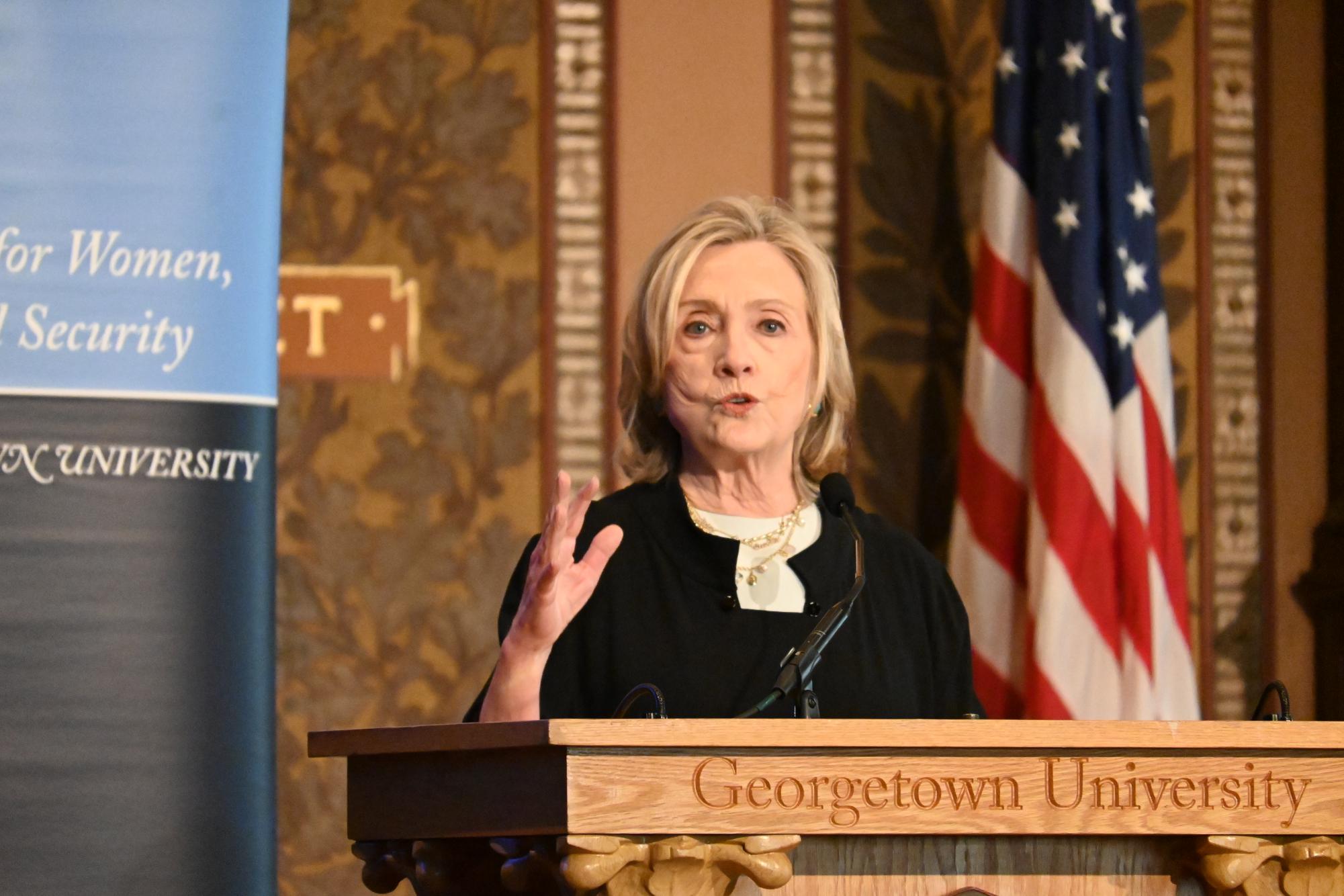Former Secretary of State Hillary Clinton honored female leaders working to safeguard democracy at Georgetown University’s annual Hillary Rodham Clinton Awards Oct. 14.
Clinton recognized two journalists: Maria Ressa — a Nobel laureate and the co-founder and chief executive officer of Rappler, an online news website in the Philippines — and Anne Applebaum, a Pulitzer Prize winner who writes for The Atlantic. The event, hosted by the Georgetown Institute for Women, Peace and Security (GIWPS), also honored women who led pro-democracy protests in Bangladesh against the country’s authoritarian former Prime Minister Sheikh Hasina in 2024 and the Venezuelan female political prisoners jailed by the country’s authoritarian leader, Nicolás Maduro.

Clinton said the honorees demonstrate the power of standing up for civil rights and freedom in the face of threats to democracy.
“The women we honor today have stood firm against a lot of blowback, a lot of intimidation, and they have shown that the rise of authoritarianism is not a foregone conclusion,” Clinton said at the event. “We can turn the tide. We can lift up not just women, but men as well, who are standing firm for our rights and our freedoms.”
Clinton presented the awards alongside GIWPS Executive Director Melanne Verveer, the former U.S. ambassador-at-large for global women’s issues, and Joel Hellman, the dean of Georgetown’s School of Foreign Service.
GIWPS honored Ressa for her coverage of human rights violations and abuses of power under Rodrigo Duterte, the former president of the Philippines who was arrested for crimes against humanity in March by the International Criminal Court, a tribunal that prosecutes international crimes.
Ressa said it is important to take action defending democracy amid growing global challenges.
“If you’re standing still, you’re not doing enough,” Ressa said at the event. “If you’re thinking about it, you’re not doing enough because a decade from now, your kids will ask you, ‘what did you do in that moment?’ And you are going to want to know that you did everything you could because this is it. This is the moment.”
Applebaum — who was honored for her writings on the global decline of democracy and the rise of authoritarianism, as well as the history of communism in Poland — said pessimism in the face of rising authoritarianism is not a helpful strategy and encouraged community-building.
“There’s a lot of pessimism right now in the United States, but I genuinely feel that pessimism is irresponsible,” Applebaum said at the event. “Pessimism is what the autocrats, what the dictators, what the kleptocrats, what the oligarchs — that’s what they want you to feel. They want you to be a nihilist, they want you to be a cynic, they want you to be apathetic.”
“This is the opposite of what you need to do,” Applebaum added. “You need to be optimistic and you need to look forward. You need to think about the future and above all, you need to be connected because as a group, you can do a lot more than you can alone.”
Tanjina Tammim Hapsa, a Bangladeshi student protest leader, and Nabila Idris — a university professor and a member of the Commission of Inquiry on Enforced Disappearances, a committee established by Bangladesh’s interim government to investigate disappearances during Hasina’s rule — accepted the award on behalf of the women protest leaders in Bangladesh.
In a written statement read by Verveer, Chief Adviser of Bangladesh Muhammad Yunus, a Nobel laureate, said women played a significant role in shaping the country’s pro-democracy movement.
“As we reflect on this pivotal chapter, it is essential to recognize and honor the remarkable role played by women whose courage, resilience and leadership not only shaped the course of the revolution, but laid the foundation for future progress in our society,” Yunus wrote in the statement. “What these young women have achieved is unprecedented. Their actions serve as a powerful reminder that the pursuit of justice cannot be fulfilled without the full and equal participation of women.”
A group of Venezuelan activists and former political prisoners accepted the award on behalf of female Venezuelan political prisoners.
According to Verveer, Georgetown initially wanted to honor María Corina Machado, a leader of the Venezuelan opposition movement and the recipient of the 2025 Nobel Peace Prize, but Machado asked that the award be given to all female Venezuelan political prisoners.
In an email from Machado to Verveer in August that Verveer read aloud at the event, Machado said the award should honor all Venezuelan women who have risked their safety and freedom.
“Today, hundreds of women have been forced into hiding and many others are in prison for leading this cause with determination,” Machado wrote. “For this reason, I would like to propose with the deepest respect and gratitude that this award become a collective recognition dedicated to the movement that sustains the struggle today, especially the women victims and the women political prisoners, whose resistance and sacrifice embody the spirit of this distinction.”
Clinton said safeguarding democracy requires confronting corruption and authoritarianism both globally and domestically.
“We cannot be silent in the face of corruption and injustice anywhere, including here at home,” Clinton said. “So as we lift up our allies who are fighting for democracy and freedom, let’s also lift up those here who are trying to do the same, against the militarization of our cities, against the stripping of rights, against corruption out in the open, against the kinds of actions being taken that are right out of the authoritarian playbook.”